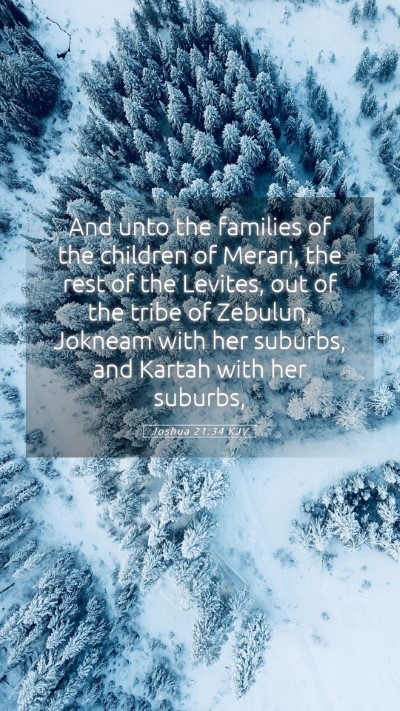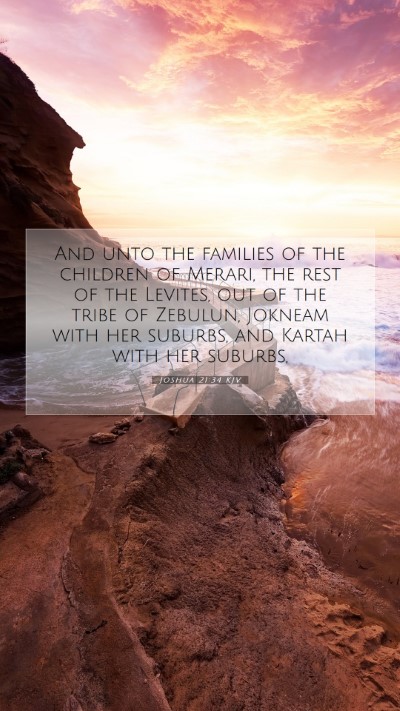Understanding Joshua 21:34
In Joshua 21:34, the verse states: "And from the tribe of Judah, the city of the refuge, which is called Hebron, they gave to Caleb the son of Jephunneh, as his inheritance."
This verse is part of a larger narrative regarding the distribution of the Promised Land among the Israelite tribes, illustrating God's faithfulness in fulfilling His promises to His people.
Bible Verse Meanings
The meaning of Bible verses often stems from examining their historical and thematic context. In this case, Joshua 21:34 highlights the significance of the cities of refuge, designated places where individuals who committed manslaughter could find protection.
Matthew Henry points out that by granting Caleb the city of Hebron, the biblical narrative reinforces the notion of reward for faithfulness, as Caleb wholeheartedly followed God's leading during the Israelite wanderings.
Albert Barnes observes that Hebron holds a historical significance as the burial site of Abraham, thus further enriching the land's value to the Israelites. By receiving this city, Caleb not only inherits land but also a legacy tied to Israel’s patriarchs.
Adam Clarke emphasizes the importance of Caleb's character as a model of faith and perseverance. His desire for Hebron, a city filled with giants, reflects his unwavering commitment to God's promises despite the challenges.
Bible Verse Interpretations
-
The allocation of cities of refuge serves as an important aspect of biblical justice, illustrating God’s provision for mercy and protection.
-
Caleb’s choice of Hebron symbolizes the rewards of faithfulness and courage in the face of adversity. His inheritance also signifies God's endorsement of his trust in divine guidance.
Scripture Analysis
In analyzing this verse, it’s essential to understand the role of the tribal areas in ancient Israel and their practical implications. Hebron, a city with great historical significance, becomes a sanctuary for those needing refuge, effectively blending justice, mercy, and deliverance into the narrative.
Historical Context
Understanding Scripture requires grasping the historical context in which these verses were written. This moment occurs after the Israelites have entered the Promised Land, marking a transition from wandering to settlement and inheritance.
The designation of cities of refuge particularly underscores God’s desire for a structured society where justice could prevail while still allowing for mercy.
Bible Study Insights
For those engaged in bible study groups, exploring Joshua 21:34 can offer profound lessons about God’s promises, the significance of faith, and how believers today can apply these lessons in personal contexts.
Utilizing bible study tools such as historical maps and commentaries, students can gain insight into the geographical and personal dynamics at play during Joshua's leadership.
Meaning of Bible Verses in Daily Life
Understanding and applying the truths from Joshua 21:34 to daily life involves recognizing God’s ongoing faithfulness and the importance of obedience to His direction. Here we see Caleb's life as a testament to the rewards that come with unwavering faith.
Additional Cross References
- Numbers 14:24 - God’s promise to Caleb for his faithfulness.
- Luke 1:53 - The importance of God's provision for those in need.
- Hebrews 11:6 - The rewards for those who earnestly seek God.
Conclusion
In summary, Joshua 21:34 serves as a powerful reminder of God’s promises fulfilled, the principles of justice and mercy, and the importance of faith and obedience. It enriches our Bible verse interpretations and guides our understanding of how to live in accordance with God's word today.


